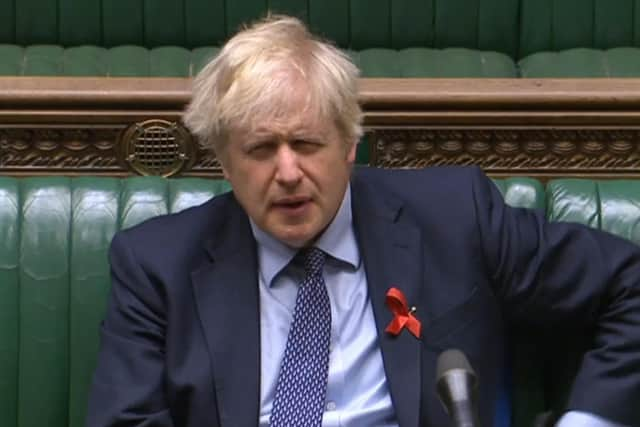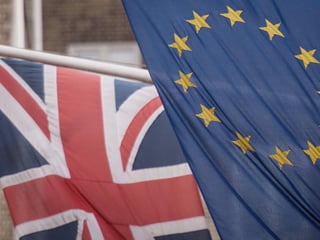Analysis: Boris Johnson has got Brexit done, but the European question is far from settled
So that was Brexit, and a happy new year.
Four years, two Prime Ministers, one election, numerous missed deadlines, several crossed red lines and a partridge in a pear tree. Brexit is done and the nation has a brief respite of talking about it until the immediate impact at the border starting today.
For Boris Johnson, this is a rousing triumph, the completion of a political project that saw him write a column defending EU membership before U-turning into an ardent leaver, a stance of principle that he later resigned over under Theresa May before outright ousting her.


Advertisement
Hide AdAdvertisement
Hide AdThis is not just the Government’s deal, this is an agreement attached to him and very much brand Boris.
Consider the repeated briefings the PM was to “take personal charge” of every issue the Tories seem to struggle with.
The PM was elected ahead of Jeremy Hunt not for his ability to grasp a brief, as Nazanin Zaghari-Ratcliffe tragically found out, but for being a force of personality who gets things done in spite of himself.
Before his election, Tory MPs were worried, Labour appeared to be on the ascendancy, and they were worrying out of ideas. So they went nuclear with the Boris option.
Doing so galvanised the party, saw Labour routed in an election, and compromises accepted by MPs on Northern Ireland and fishing that Mrs May would have refused to consider.
Things have not been so rosy during the pandemic. MPs on the right have questioned his lockdown measures, and those on the left have questioned whether Mr Johnson was the man for a crisis.
In delivering this deal, he has united a party that had began to murmur its discontent over his handling of the coronavirus a little louder, and see the European Research Group, so often a thorn in the side of Tory leaders, rally behind it because, frankly, it’s too late to suggest otherwise now.
Not a single Tory MP voted against the deal, with just two abstaining – hardline Brexiteers Owen Paterson and Sir John Redwood. Despite not voting for it, Sir John still spoke of his “relief” that it was done.
Advertisement
Hide AdAdvertisement
Hide AdMr Johnson has even extended an olive branch to the every shrinking pro-remain part of his party, saying: “I hope and believe that this agreement will also serve to end some of the rancour and recrimination that we’ve had in recent years, allow us to come together as a country, to leave old arguments, old desiccated, tired, super-masticated arguments behind, move on and build a new and great future for our country.”
His next step will be to shore up this support ahead of even further restrictions across England, with 44.1 million people in England now in tier four, equivalent to 78 per cent of the population.
The economy has seen an 8 per cent contraction in gross domestic product since January, and while a vaccine will help, the PM is still going to have to justify harsh restrictions to a party that places great value on individual liberty.
For Labour, Sir Keir Starmer suffered a few low-profile front bench resignations as well as almost a fifth of his MPs ignoring a three-line whip to support the agreement.
Junior ministers Helen Hayes and Tonia Antoniazzi resigned as they refused to back the deal. Just one Labour MP, Bell Ribeiro-Addy, voted against, while another 36 abstained.
There were also complications in Scotland, where the party’s only MP Ian Murray voted for the deal, despite his Scottish Labour colleagues in Holyrood voting against.
Despite this apparent lack of unity, the result of the vote is good news for Sir Keir.
Those refusing to follow the whip were predominantly among the socialist group of MPs who backed Jeremy Corbyn, and as such welcomed the chance to go against the Labour leader.
Advertisement
Hide AdAdvertisement
Hide AdDespite this fierce defence of the MP for Islington North, they still could not bring themselves to vote against the deal. The matter is settled, and Labour can now focus on holding the Government to account on the fallout.
It also weakens the Tory attacks on Sir Keir that were already looking desperate.
When criticised by the former head of the CPS, Mr Johnson would frequently accuse him of not wanting to leave, routinely labelling him an “Islington remainer”.
Backing the deal enables Sir Keir to claim he acted in the interests of the country, to heal wounds in northern seats, and now move onto other things.
This has already been made apparent by his new year’s message, with language clearly designed to win back those areas that feel New Labour had failed to represent them.
Speaking on Thursday, he said: “The Labour Party that I lead will focus on ensuring that path leads to greater prosperity, fairness and opportunity for every nation and region, every village, every town and city that makes up our great United Kingdom.
"I believe this can once again be the best country to grow up in and the best country to grow old in.
"And with that hope and that vision, I believe that our best years are still to come."
Advertisement
Hide AdAdvertisement
Hide AdBrexit has rallied the Conservatives around the PM and will hand him a much-needed boost as his handling of the pandemic continues to come under scrutiny.
For Labour, a minor rebellion suggests while the party and its leadership are still pro Europe, they understand there are certain fights you cannot win, if you want to win.
If you haven't already, please consider supporting our trusted, fact-checked journalism by taking out a digital subscription.
Comments
Want to join the conversation? Please or to comment on this article.
